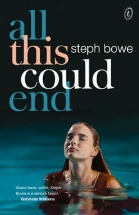All this could end by Steph Bowe

Text Publishing, 2013. ISBN 9781921758447.
(Age: 15+) Steph Bowe's first novel was an absolute gem, with
credible characters facing emotional dilemmas. Her latest novel
seems more uneven in credibility and characterisation. On the
surface, our protagonists (Nina and Spencer) seem to have little in
common. Nina's family moves around a lot, living closely in tiny
apartments or motel rooms... and they rob banks for a living!
Spencer has lived in the same large house all his life but his
family are distant; his father is that pillar of respectability, a
bank manager.
What brings these two together is a shared sense of isolation. Nina
remains aloof from her classmates due to her family's criminal
history; Spencer remains aloof out of social awkwardness. Nina can't
wait to escape her family's criminal lifestyle but refuses to
challenge her mother directly. Spencer feels helpless as he watches
his family growing further apart.
Whilst many teens will empathise with Nina and Spencer's uncertainty
about their futures, credibility is sometimes stretched in this
novel, particularly with Nina's family. Could her father really be
so blindly in love with his wife that he can't see why his children
should not be living a life of crime? The novel's denouement also
seems just a little too easy. Whilst Spencer's final comment may
express a lovely sentiment, it hardly seems realistic given what has
already occurred.
Some of the characterisation is initially handled awkwardly, too.
When Spencer is first introduced we seem to be told a lot about his
personality rather than being allowed to see his traits in action. His
love of words, for instance, only comes into play late in the novel.
Perhaps the fact that his story is told in third person (rather than
the first person used for Nina) actually works against his character
development.
Despite these credibility strains, there is also a lot to enjoy in
this novel (particularly in Spencer's friend, Bridie). There is also
a lot to ponder (about parental responsibility, for a start) so fans
of Steph Bowe's first novel may well be won over by novel's end.
Deborah Marshall